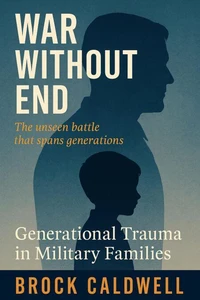Invisible wounds of war can devastate even the strongest soldiers, leaving scars that are unseen, unspoken, and often misunderstood. Silent Wounds: Hidden Psychological Injuries of War delves into the complex world of psychological trauma faced by veterans, exploring post-traumatic stress disorder (PTSD), moral injury, survivor's guilt, and the daily battles that continue long after the battlefield has fallen silent.
Drawing on the latest research in military psychology, real-life stories of veterans, and expert insights from mental health professionals, this book illuminates the silent suffering that affects not only soldiers but also their families, communities, and society at large. From hypervigilance, dissociation, and anxiety to struggles with intimacy, trust, and reintegration into civilian life, the hidden scars of war shape behavior, relationships, and the ability to cope with everyday challenges.
Silent Wounds addresses the stigma surrounding mental health in military culture, the fear of being judged as "weak, " and the barriers veterans face in seeking help. It highlights coping mechanisms, both constructive and destructive, and emphasizes the importance of therapy, peer support, creative expression, and holistic approaches to recovery. The book also explores the ripple effects of trauma on spouses, children, and social networks, revealing how invisible injuries extend far beyond the individual.
In addition to uncovering the psychological aftermath of combat, Silent Wounds offers hope and practical guidance for healing. It emphasizes the power of acknowledgment, the role of community, and the transformative potential of understanding, empathy, and resilience. Through compelling narratives and evidence-based insights, the book equips readers with the knowledge to recognize, support, and connect with those who carry invisible burdens.
Whether you are a veteran, a family member, a mental health professional, or simply someone seeking to understand the unseen consequences of war, Silent Wounds provides an essential guide to navigating the complex terrain of hidden psychological injuries. By shedding light on these silent battles, the book not only validates the experiences of those affected but also encourages society to break the silence, embrace awareness, and foster healing.
Invisible wounds of war can devastate even the strongest soldiers, leaving scars that are unseen, unspoken, and often misunderstood. Silent Wounds: Hidden Psychological Injuries of War delves into the complex world of psychological trauma faced by veterans, exploring post-traumatic stress disorder (PTSD), moral injury, survivor's guilt, and the daily battles that continue long after the battlefield has fallen silent.
Drawing on the latest research in military psychology, real-life stories of veterans, and expert insights from mental health professionals, this book illuminates the silent suffering that affects not only soldiers but also their families, communities, and society at large. From hypervigilance, dissociation, and anxiety to struggles with intimacy, trust, and reintegration into civilian life, the hidden scars of war shape behavior, relationships, and the ability to cope with everyday challenges.
Silent Wounds addresses the stigma surrounding mental health in military culture, the fear of being judged as "weak, " and the barriers veterans face in seeking help. It highlights coping mechanisms, both constructive and destructive, and emphasizes the importance of therapy, peer support, creative expression, and holistic approaches to recovery. The book also explores the ripple effects of trauma on spouses, children, and social networks, revealing how invisible injuries extend far beyond the individual.
In addition to uncovering the psychological aftermath of combat, Silent Wounds offers hope and practical guidance for healing. It emphasizes the power of acknowledgment, the role of community, and the transformative potential of understanding, empathy, and resilience. Through compelling narratives and evidence-based insights, the book equips readers with the knowledge to recognize, support, and connect with those who carry invisible burdens.
Whether you are a veteran, a family member, a mental health professional, or simply someone seeking to understand the unseen consequences of war, Silent Wounds provides an essential guide to navigating the complex terrain of hidden psychological injuries. By shedding light on these silent battles, the book not only validates the experiences of those affected but also encourages society to break the silence, embrace awareness, and foster healing.

 , qui est-ce ?
, qui est-ce ?